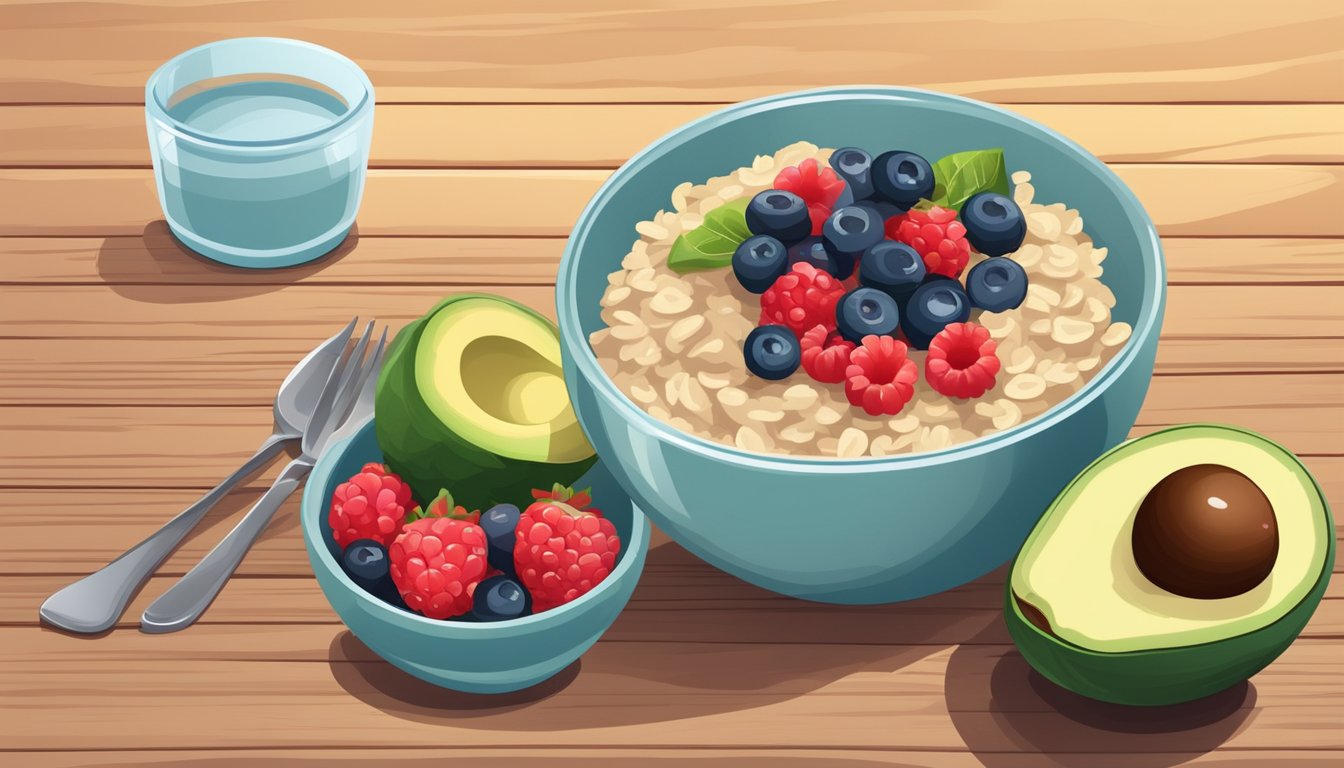Breakfast plays a crucial role in jumpstarting metabolism and setting the tone for healthy eating throughout the day. Choosing the right foods in the morning can support weight loss efforts and provide sustained energy. To lose weight, focus on high-protein, fiber-rich breakfast options like eggs, Greek yogurt, oatmeal, and fresh fruit.
These nutrient-dense choices help increase feelings of fullness and reduce cravings later in the day. Protein-packed eggs or Greek yogurt paired with berries offer a satisfying combination that can keep hunger at bay for hours. Oatmeal topped with nuts and seeds provides complex carbohydrates and healthy fats to fuel the body.
Avoiding sugary, processed breakfast foods is key for weight management. Instead, opt for whole, unprocessed ingredients that nourish the body and support a healthy metabolism. By making smart breakfast choices, individuals can take a significant step toward achieving their weight loss goals while still enjoying delicious and satisfying morning meals.
Understanding Weight Loss

Weight loss involves creating a calorie deficit and optimizing nutrient intake. Breakfast plays a key role in this process by jumpstarting metabolism and setting the tone for the day’s eating habits.
The Role of Breakfast in Weight Management
Eating a nutritious breakfast can help control appetite and reduce overall calorie intake throughout the day. A protein-rich morning meal increases feelings of fullness and helps stabilize blood sugar levels. This can prevent overeating later and minimize cravings for unhealthy snacks.
Studies show that people who eat breakfast regularly tend to maintain a healthier weight. A balanced morning meal provides essential nutrients and energy to fuel physical activity and support weight loss efforts.
Calorie Deficit Explained
Weight loss occurs when the body burns more calories than it consumes. This creates a calorie deficit, forcing the body to use stored fat for energy. A deficit of 500-750 calories per day can lead to 1-2 pounds of weight loss per week.
To achieve this, focus on consuming nutrient-dense, lower-calorie foods. Incorporate more fruits, vegetables, lean proteins, and whole grains into meals. Reduce intake of high-calorie, processed foods and sugary beverages.
Regular physical activity also helps create a calorie deficit by increasing the number of calories burned each day.
Importance of Nutrient Density
Nutrient-dense foods provide essential vitamins, minerals, and other beneficial compounds with relatively few calories. These foods help the body function optimally while supporting weight loss efforts.
Examples include:
- Leafy greens (spinach, kale)
- Berries (strawberries, blueberries)
- Lean proteins (chicken breast, fish)
- Whole grains (oats, quinoa)
Focusing on nutrient-dense options ensures the body receives necessary nutrients even when reducing calorie intake. This helps maintain energy levels, supports metabolism, and promotes overall health during weight loss.
Macronutrients for a Weight Loss Breakfast

A balanced breakfast with the right macronutrients can jumpstart weight loss efforts. Focusing on protein, healthy fats, and fiber helps promote fullness and stabilize blood sugar levels.
Proteins and Their Importance
Protein plays a crucial role in weight loss breakfasts. It increases satiety, reduces hunger hormones, and preserves muscle mass during calorie restriction.
Aim for 20-30 grams of protein at breakfast. Good sources include:
- Eggs
- Greek yogurt
- Cottage cheese
- Lean meats like turkey or chicken breast
- Plant-based options such as tofu or legumes
Protein-rich breakfasts can lead to eating fewer calories throughout the day. They also support muscle maintenance and repair, which is essential for a healthy metabolism.
Healthy Fats to Include
Contrary to popular belief, fats are an important part of a weight loss breakfast. They provide energy, aid nutrient absorption, and contribute to feelings of fullness.
Focus on these healthy fat sources:
- Avocado
- Nuts and seeds
- Olive oil
- Nut butters
A tablespoon of chia seeds or a quarter of an avocado can add nutritious fats to your morning meal. These fats help slow digestion, keeping you satisfied longer.
Fiber-Rich Foods for Fullness
Fiber is a key component for weight loss breakfasts. It promotes fullness, supports digestive health, and helps regulate blood sugar levels.
Incorporate these fiber-rich foods:
- Oatmeal
- Berries
- Whole grain toast
- Vegetables like spinach or bell peppers
Aim for at least 5 grams of fiber in your breakfast. Combining fiber with protein, such as oatmeal with Greek yogurt, creates a powerful duo for satiety and weight management.
Breakfast Foods to Eat for Weight Loss
Certain breakfast options can support weight loss goals by providing essential nutrients and promoting feelings of fullness. These foods offer a balance of protein, fiber, and healthy fats to kickstart your metabolism and curb cravings throughout the day.
Eggs: A Versatile Protein Source
Eggs are an excellent breakfast choice for weight loss. They’re rich in high-quality protein, which helps build and maintain muscle mass. One large egg contains about 6 grams of protein and only 78 calories.
Eggs also contain choline, a nutrient that supports brain health and metabolism. Studies have shown that eating eggs for breakfast can increase feelings of fullness and reduce calorie intake at subsequent meals.
Try preparing eggs in various ways: boiled, scrambled, or as an omelet with vegetables. For a quick and easy option, make a batch of hard-boiled eggs at the start of the week.
Oatmeal: The Heart-Healthy Choice
Oatmeal is a fiber-rich breakfast that can aid in weight loss. It’s packed with beta-glucan, a type of soluble fiber that slows digestion and increases satiety.
One cup of cooked oatmeal provides about 4 grams of fiber and 6 grams of protein. This combination helps stabilize blood sugar levels and keeps you feeling full longer.
To boost the nutritional value, top your oatmeal with fresh fruits, nuts, or a dollop of Greek yogurt. Choose plain, unsweetened oatmeal and add your own flavorings to control sugar intake.
Greek Yogurt and Its Benefits
Greek yogurt is a protein powerhouse that can support weight loss efforts. It contains nearly double the protein of regular yogurt, with about 17 grams per 6-ounce serving.
The high protein content promotes feelings of fullness and helps preserve muscle mass during weight loss. Greek yogurt is also rich in probiotics, which can improve gut health and potentially aid in weight management.
For added nutrition, mix in fresh berries, a sprinkle of nuts, or a drizzle of honey. Choose plain, unsweetened varieties to avoid added sugars.
Berries and Antioxidants
Berries are low in calories but high in fiber and antioxidants, making them an ideal breakfast food for weight loss. Raspberries, strawberries, blueberries, and blackberries are all excellent choices.
One cup of mixed berries provides about 8 grams of fiber and only 50-85 calories, depending on the variety. The fiber helps slow digestion and keeps you feeling full.
Berries are also rich in antioxidants like anthocyanins, which may help reduce inflammation and support overall health. Add berries to your oatmeal, yogurt, or eat them on their own for a nutritious breakfast boost.
Nuts and Seeds for Nutrients
Nuts and seeds are nutrient-dense foods that can be part of a weight-loss-friendly breakfast. They’re high in healthy fats, protein, and fiber, which work together to promote satiety.
A small handful (about 1 ounce) of almonds provides 6 grams of protein, 3.5 grams of fiber, and 14 grams of healthy fats. Chia seeds are another great option, offering 4 grams of protein and 11 grams of fiber per ounce.
Sprinkle nuts or seeds on your oatmeal or yogurt, or blend them into a smoothie. Be mindful of portion sizes, as nuts and seeds are calorie-dense.
High-Protein Breakfast Foods
Incorporating high-protein foods into your breakfast can significantly support weight loss efforts. Protein increases metabolism, reduces appetite, and helps maintain muscle mass during weight loss.
Some protein-rich breakfast options include:
- Cottage cheese: 14 grams of protein per 1/2 cup
- Turkey or chicken breast: 25 grams of protein per 3 ounces
- Tofu: 10 grams of protein per 1/2 cup
Combine these with whole grains and vegetables for a balanced meal. For example, try a tofu scramble with spinach and whole grain toast, or a cottage cheese bowl topped with fresh fruit and a sprinkle of nuts.
Innovative Breakfast Ideas for Weight Loss
Exploring creative and nutritious morning meals can make weight loss efforts more enjoyable and sustainable. These options provide balanced nutrition while keeping calorie counts in check.
Overnight Oats Variations
Overnight oats offer a convenient and customizable breakfast. Mix rolled oats with milk or yogurt and refrigerate overnight. Add chia seeds for extra fiber and protein.
Try different flavor combinations:
- Apple cinnamon with diced apples and a dash of cinnamon
- Berry blast with mixed berries and a drizzle of honey
- Tropical twist with mango, coconut flakes, and a splash of pineapple juice
Top with nuts or seeds for healthy fats. This fiber-rich meal keeps you full and energized throughout the morning.
Smoothies for On-the-Go Nutrition
Smoothies pack nutrients into a portable format. Blend leafy greens like spinach or kale with fruit for a vitamin boost. Add protein powder or Greek yogurt to increase satiety.
Some nutrient-dense combinations:
- Green goddess: Spinach, banana, almond milk, and chia seeds
- Berry protein: Mixed berries, Greek yogurt, and vanilla protein powder
- Tropical green: Mango, pineapple, coconut water, and spinach
Include a tablespoon of nut butter for healthy fats. Freeze fruit in advance for a thicker texture without added ice.
Avocado Toast and Toppings
Avocado toast provides healthy fats and fiber. Choose whole grain bread for added nutrients. Mash ripe avocado and spread on toasted bread.
Experiment with toppings:
- Sliced tomatoes and a sprinkle of sea salt
- Poached egg and red pepper flakes
- Smoked salmon and capers
- Sliced radishes and a drizzle of olive oil
Add a squeeze of lemon juice to prevent browning. This versatile dish combines complex carbs, healthy fats, and optional protein for a balanced meal.
Creative Egg-Based Dishes
Eggs offer high-quality protein and essential nutrients. Move beyond basic scrambled eggs with these ideas:
- Veggie-packed frittatas: Mix beaten eggs with chopped vegetables and bake in a skillet.
- Egg muffins: Whisk eggs with vegetables and cheese, then bake in muffin tins for portable portions.
- Shakshuka: Simmer eggs in a spiced tomato sauce for a flavorful twist.
- Egg white omelettes: Stuff with spinach, mushrooms, and low-fat cheese for a lighter option.
Add herbs and spices for flavor without extra calories. These dishes provide protein to keep hunger at bay.
Protein Pancakes and Waffles
Transform traditional pancakes and waffles into protein-rich alternatives. Use protein powder, Greek yogurt, or cottage cheese in the batter.
Try these recipes:
- Banana protein pancakes: Mash ripe bananas with eggs and protein powder
- Oatmeal protein waffles: Blend oats, egg whites, and protein powder for a hearty texture
- Zucchini protein pancakes: Grate zucchini into the batter for added nutrients and moisture
Top with fresh fruit instead of syrup for natural sweetness. These options satisfy cravings while supporting weight loss goals.
Including Vegetables and Fruits

Adding vegetables and fruits to breakfast can boost weight loss efforts. These nutrient-dense foods provide essential vitamins, minerals, and fiber while keeping calorie counts low.
Veggie Omelets and Frittatas
Veggie omelets and frittatas offer a protein-packed start to the day. Eggs provide high-quality protein, while vegetables add fiber and nutrients. Popular choices include spinach, bell peppers, onions, and mushrooms.
To make a veggie omelet, whisk eggs with a splash of milk, then pour into a heated, non-stick pan. Add chopped vegetables and cook until set. Fold in half and serve.
Frittatas are similar but cooked in the oven. Mix eggs with vegetables in an oven-safe skillet, then bake until golden. This method allows for larger portions and easy meal prep.
Both options can be customized with different vegetable combinations. Try adding herbs or a sprinkle of low-fat cheese for extra flavor.
Fruit-Topped Yogurt Parfaits
Yogurt parfaits combine protein-rich yogurt with fiber-packed fruits. Greek yogurt is an excellent choice due to its high protein content and creamy texture.
Layer Greek yogurt with fresh or frozen berries, such as strawberries, blueberries, or raspberries. These fruits are low in calories but high in antioxidants and fiber.
Add a sprinkle of nuts or seeds for healthy fats and extra crunch. Almonds, walnuts, or chia seeds work well.
For added sweetness without excess sugar, drizzle with a small amount of honey or maple syrup. This breakfast option supports gut health due to the probiotics in yogurt and fiber from fruits.
Breakfast Salads: A New Trend
Breakfast salads offer a fresh take on morning meals. They pack vegetables and fruits into the first meal of the day, increasing fiber and nutrient intake.
Start with a base of leafy greens like spinach or kale. Add chopped vegetables such as cucumber, tomatoes, or bell peppers.
Include a protein source like hard-boiled eggs, grilled chicken, or smoked salmon. Salmon provides omega-3 fatty acids, beneficial for heart health.
Top with fresh fruits like berries or citrus segments for a sweet contrast. A light vinaigrette or lemon juice dressing keeps the salad low in calories.
This fiber-packed option aids digestion and promotes feelings of fullness, potentially reducing overall calorie intake throughout the day.
Planning and Preparing Your Breakfasts

Successful weight loss starts with a well-planned breakfast routine. Organizing your mornings and meals can make healthy eating easier and more sustainable.
Meal Prep Strategies
Batch cooking is a game-changer for busy schedules. Prepare a large batch of overnight oats or chia seed pudding on Sunday for the week ahead. Store individual portions in mason jars or containers for grab-and-go convenience.
Hard-boil a dozen eggs at once. They’ll keep in the refrigerator for up to a week, providing a quick protein source. Pre-cut fruits and vegetables to save time during hectic mornings.
Consider making freezer-friendly breakfast burritos or egg muffins. These can be reheated quickly and provide a balanced meal with protein, fiber, and healthy fats.
Healthy Breakfast on a Budget
Oatmeal is an affordable, fiber-rich breakfast option. Buy in bulk and flavor with cinnamon, nuts, or frozen berries for variety. Greek yogurt is another cost-effective protein source. Purchase larger tubs instead of individual servings.
Eggs are inexpensive and versatile. Pair them with whole grain toast and avocado for a nutrient-dense meal. Frozen fruits and vegetables are often cheaper than fresh and maintain their nutritional value.
Consider plant-based proteins like beans or lentils. They’re budget-friendly and can be incorporated into breakfast bowls or savory toast toppings.
Time-Saving Tips for Busy Mornings
Set out non-perishable items like bowls, spoons, and dry ingredients the night before. This small step can save precious minutes in the morning rush.
Invest in a blender for quick smoothies. Combine frozen fruits, Greek yogurt, and spinach for a nutrient-packed breakfast in minutes. Pre-portion smoothie ingredients into freezer bags for even faster preparation.
Utilize a slow cooker or instant pot for hands-off breakfast preparation. Steel-cut oats or egg casseroles can cook overnight, ready to eat when you wake up.
Keep portable options like nuts, whole fruit, or homemade granola bars on hand for extremely rushed days. These can provide essential nutrients when time is tight.
Considerations for Special Diets

Special diets require careful planning to ensure nutritious and satisfying breakfast options for weight loss. Adapting breakfast choices to accommodate dietary restrictions can still provide ample opportunities for delicious and healthy meals.
Gluten-Free Breakfast Options
Gluten-free breakfasts can be both nutritious and weight-loss friendly. Oats are naturally gluten-free, but look for certified gluten-free varieties to avoid cross-contamination. Chia seeds and flaxseeds make excellent additions to gluten-free cereals or smoothies, providing fiber and healthy fats.
Eggs are a versatile gluten-free protein source. Pair them with vegetables for a filling omelet or frittata. Gluten-free toast or wraps can be used as a base for avocado toast or breakfast burritos.
Quinoa is a protein-rich, gluten-free grain that can be prepared as a warm breakfast porridge. Top it with fresh fruits and nuts for added flavor and nutrients.
Dairy-Free Breakfast Choices
Dairy-free breakfasts can still be creamy and satisfying. Plant-based milk alternatives like almond, soy, or oat milk work well in smoothies or with cereals. These options are often lower in calories than whole milk, supporting weight loss efforts.
Coconut yogurt or other non-dairy yogurts provide probiotics and can be paired with fresh berries and a sprinkle of seeds for a nutritious start to the day. Avocado toast on whole-grain bread offers healthy fats and fiber without dairy.
For a savory option, try a tofu scramble with vegetables and nutritional yeast for a cheesy flavor. Black beans can be added for extra protein and fiber.
Vegetarian and Vegan Alternatives
Plant-based breakfasts offer numerous weight loss-friendly options. Smoothie bowls made with plant-based protein powder, fruits, and leafy greens provide a nutrient-dense meal. Top with chia seeds or flaxseeds for added omega-3 fatty acids.
Overnight oats prepared with plant milk and chia seeds create a protein-rich breakfast. Add fresh or frozen berries for natural sweetness and antioxidants. Chickpea flour pancakes or omelets offer a high-protein alternative to traditional egg-based versions.
A whole-grain toast topped with mashed avocado and sliced tomatoes provides healthy fats and fiber. For a warm option, try a veggie-packed tofu scramble with turmeric for added anti-inflammatory benefits.
Beverages That Support Weight Loss
Certain drinks can boost metabolism and aid weight loss efforts when consumed as part of a healthy breakfast. These beverages provide hydration, nutrients, and compounds that may help burn fat.
The Impact of Coffee on Metabolism
Coffee contains caffeine, which can increase metabolic rate and fat burning. Studies show drinking coffee before exercise may enhance fat oxidation. Black coffee is calorie-free and can suppress appetite.
Adding milk or sugar negates some benefits, so drink it black or with a splash of unsweetened plant milk. Limit intake to 1-2 cups daily to avoid jitters or sleep issues.
Those sensitive to caffeine should opt for decaf, which still provides antioxidants. Coffee’s effects on metabolism are most pronounced in lean individuals.
Green Tea and Weight Loss
Green tea boosts metabolism through its caffeine and catechin content. Catechins are antioxidants that may promote fat burning, especially in the abdominal area.
Research indicates drinking 2-3 cups of green tea daily can increase calorie burn by 3-4%. It’s most effective when consumed before exercise.
Matcha green tea powder contains more catechins than brewed green tea. Add it to smoothies or lattes for an extra metabolic boost. Green tea also provides L-theanine, which promotes calmness and focus.
Smoothie Recipes for Hydration and Nutrition
Smoothies offer hydration, fiber, and nutrients to support weight loss. Use low-calorie bases like unsweetened almond milk or green tea.
Add protein powder or Greek yogurt for satiety. Include leafy greens for vitamins and fiber. Berries provide antioxidants and natural sweetness.
Try this recipe: Blend 1 cup spinach, 1/2 cup berries, 1 scoop whey protein, 1 tbsp chia seeds, and 1 cup unsweetened almond milk. This provides protein, fiber, and nutrients for only 250 calories.
Avoid high-sugar fruits and juices. Use small amounts of banana or avocado for creaminess. Add ice for volume without calories.




